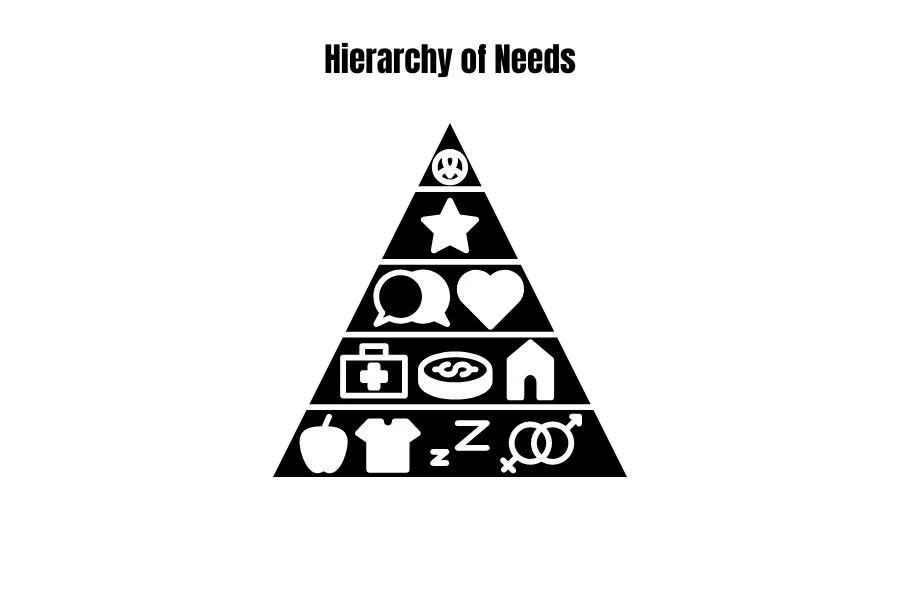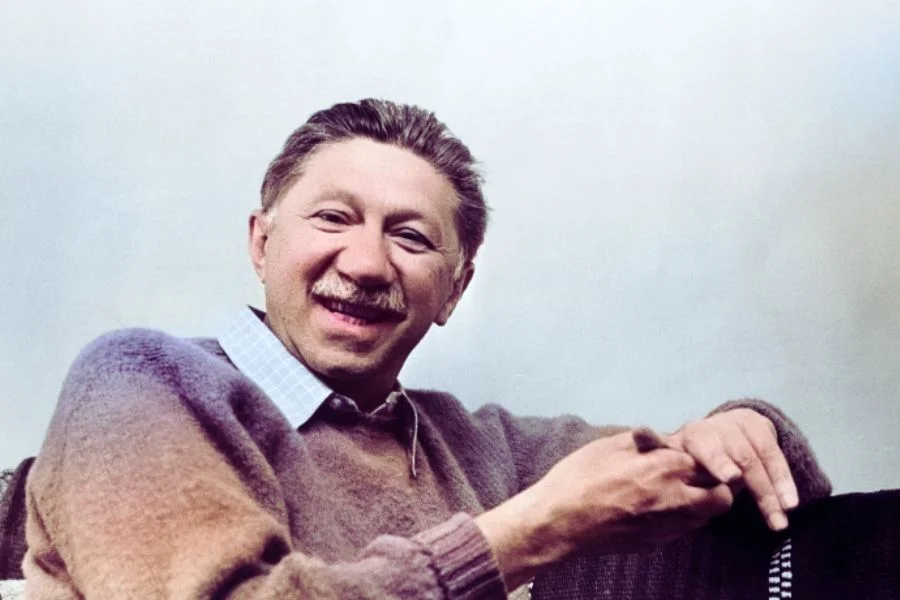Abraham Maslow is undoubtedly one of the most influential contributors to psychology. As a pioneering individual in his field, he has had an enduring effect on how human behavior and motivation are interpreted.
His theories regarding self-actualization, humanistic psychology, and his renowned hierarchy of needs have become accepted among psychologists and educators. This article will explore Maslow’s life story and examine his pertinent theories today.
Additionally, we shall assess how his work has entirely reformed our perception of psychological requirements; furthermore, it can also be utilized to encourage constructive development among individuals. Thus, let us journey through Maslow’s transformative legacy!
Table of Contents
Life and Biography of Abraham Maslow

Early Life and Education
An American psychologist named Abraham Maslow is well known for his theory of human motivation, which he called the “hierarchy of needs.” Maslow, born in 1908 and raised in Brooklyn, completed a degree at City College before receiving a Ph.D. from the University of Wisconsin-Madison. Subsequently, he had teaching positions at both Brooklyn College and Brandeis University.
In addition to theories regarding human motivation, Maslow also developed ideas concerning self-actualization and peak experiences. Maslow first discovered an interest in psychology while studying law at City College.
Influences and Shift to Psychology
Following a shift in his major, he began to create what would eventually become renowned as the Hierarchy of Needs theory. This hypothesis proposes that people are driven by their desire for self-actualization and do so through addressing five fundamental needs: physiological (nourishment/water), safety (security), affinity or love (affectionate interaction with others), esteem (recognition/accomplishments) and ultimately, self-actualization – achieving one’s maximum potential. Subsequently, when each level is fulfilled, it no longer motivates our behavior; instead, we move on to achieve higher levels of need satisfaction.
Maslow’s work left an indelible imprint on contemporary psychology by offering an understanding of why individuals will act differently depending on whether their necessities have been adequately addressed.
Academic and Professional Journey
Maslow has proposed concepts adopted in multiple arenas, such as education, management training, and health care delivery systems, to comprehend how people may access their maximum capabilities both on a personal level and professionally within the context of the environment or situation they are facing.
Maslow was a proponent of research into humanistic psychology, which considers the individual as a whole rather than merely focusing on any particular trait or symptom.
His theories concerning human motivation have also been utilized to understand why some people can triumph over incredible adversity while others struggle more heavily due to lacking resources or support to realize their true potential.
Through viewing each person individually, Maslow argued that it could better comprehend what motivates an individual and how these motivations can be employed productively by channeling them into creative outlets; furthermore, this would affect our self-image and ultimately create purposeful lives.
Abraham Maslow’s Theories
Maslow’s theories are among psychology’s most consequential and enduring contributions. His understanding revolutionized our perspectives regarding motivation, human development, and even comprehension of mental health.
Hierarchy of Needs

Maslow formulated a hierarchy of needs that has grown into one of the famous models in psychology. According to his idea, all humans have five essential requirements which must be fulfilled for them to reach their ultimate potential.
Maslow identified five distinct levels of needs that individuals must satisfy to reach their full potential. These include:
- Physiological Needs, such as water and food
- Safety Needs, which encompass security and stability
- Love/Belonging requirements for friendship and family
- Esteem Requirements from others regarding recognition or respect
- Self- Actualization: Fulfilling one’s true potential
Additionally, Maslow developed a concept known as ‘Self-Actualization,’ indicating that once an individual meets the basic physiological and safety demands necessary for survival, they can progress towards achieving higher ambitions, including realizing creative possibilities or determining purposefulness within life.
Self-Actualization and Peak Experiences

Maslow’s theories on self-actualization have left a deep impression on modern psychology; many psychologists now maintain that achieving this level is essential for mental health.
In addition, Maslow was noteworthy for his research into human growth by studying motivation, creativity, morality, values, productivity, learning style, and communication styles. He opined that people had the potential to reach their maximum extent of functioning if they were provided with sufficient liberty from external influences such as fear or suppression; he regarded this autonomy to be indispensable in terms of healthy psychological maturation.
Maslow delivered an invaluable insight into how humans can attain satisfaction in life through meeting their fundamental physiological and security needs while aspiring towards more elevated objectives like self-actualization. His ideas have received widespread support from academics and clinicians alike, who use them to understand human behavior’s nuances better.
Impact of Hierarchy of Needs on Psychology
According to this theory, human wants can be arranged in a hierarchy, with more complex psychological demands at the top and fundamental physiological needs at the bottom.
According to Maslow, before any individual can move on from one level to another, they must initially satisfy each existing need from lower levels within the pyramid. This assumption’s impact on modern-day psychology is significant; it continues to be used for various purposes, such as motivation, behavior, and self-actualization studies.
Maslow’s Hierarchy of Needs fundamentally delineates five primary classes of human necessity. Each classification is essential for life satisfaction; however, these levels are not isolated. On the contrary, they overlap and cooperate. For instance, a person may have difficulty attaining self-actualization without having gratifying social relations or feeling secure in their environment.
Application in Motivation and Behavior Studies
Maslow proposed that an individual can only reach their highest potential when all lower needs have been satisfied first; this principle is widely accepted by many psychologists today as a valid way of interpreting human behavior.
Moreover, it stresses the importance of providing individuals with surroundings to meet basic physical and psychological requirements and cultivate amicable ties with those around them.
By recognizing how these components interact harmoniously to generate meaningful experiences for people during various stages of life, we may acquire more excellent knowledge of how humans think and act within contrasting circumstances.
Consequently, this guides us towards improving our understanding of how our deeds influence those around us, such as family members or co-workers – enabling the construction of more healthful environments for everyone involved, regardless of whether they acknowledge it!
Applying Abraham Maslow’s Theory to Everyday Life

Maslow’s ideas are so powerful and applicable to everyday life that they have been adopted by many people who are not professionally involved with psychology. At its core, Maslow’s theory proposes that five basic needs must be met for an individual to reach their full potential.
Maslow’s theory is notable for its simplicity. It allows us to comprehend our conduct without becoming mired in abstruse ideas or convoluted equations. It furnishes us with standards for understanding why we act a certain way or prioritize some things over others.
Practical Application in Education
Maslow’s theories have been utilized in many educational settings, both within standard classrooms and otherwise. Educators seek approaches that will allow students to satisfy their fundamental needs as they confront new material.
Utilization in Business and Management
At the same time, business managers employ it to create cohesive teams. Therapists take advantage of these concepts while attempting to comprehend their clientele’s motivations.
Influence on Personal Development
Parents can also benefit from such ideas when raising kids who understand how to esteem themselves and strive toward personal development.
Relationship between Self-Actualization & Fulfillment
Maslow’s most impactful contribution to the field was his hypothesis concerning self-actualization and fulfillment. He was adamant that these two principles were closely interlinked, and both components had to be attained for an individual to obtain authentic joyfulness and contentment with life altogether.
Understanding Self-Actualization and Attaining Fulfillment
Self-actualization may be defined as achieving or reaching one’s maximum capability. At the same time, fulfillment implies getting a sense of satisfaction with oneself and existence as a whole.
Maslow posited that self-actualization was a perpetual trek towards individual advancement, in which persons endeavor to achieve ever more prominent statures within themselves while making strides for expanded comprehension and tolerance from those nearby.
On this way toward self-accomplishment, Maslow proposed that perceiving one’s qualities and shortcomings was essential to making headway toward genuine acknowledgment.
Moreover, he highlighted the importance of being mindful of our environment so we can exploit its chances, which can help us venture into better profundities of understanding ourselves.
Psychological Studies on the Connection
The concept that a close bond between self-actualization and fulfillment exists has been examined for numerous years by psychologists, beginning with Maslow unveiling his theories on the topic in 1943.
Various studies have demonstrated how achieving higher levels of personal growth results in greater satisfaction with life. To illustrate this point, research implies that recognizing one’s inner strength not only makes an individual more contented within themselves but also aids them in comprehending ways they can benefit from their abilities proficiently so they can achieve desired targets faster than without understanding themselves.
Criticisms and Contributions to the Field of Psychology

Evaluating Maslow’s Theories
Maslow still made many paramount contributions to the discipline of psychology. He is widely renowned for his “hierarchy of needs” theory. This hypothesis has become an essential part of psychological discourse worldwide. It continues to be taught in educational settings worldwide, even today. Still, there is much more than just this notion attributed to Maslow’s achievements in psychology.
Controversies and Challenges
Despite his accomplishments in psychology, Maslow has been subject to criticism over time as well. One such critique suggests that his theories are too elementary and do not involve more intricate human behaviors.
Furthermore, many allege that his notions have been removed from their original scope and abused by individuals who lack appropriate training or experience in psychology.
Lasting Impact on Psychology
Regardless of any criticisms that may be levied against him, it is undeniable that Maslow has made a lasting and significant impact on psychology. His work concerning motivation and self-actualization theory has been extensively studied even though those theories are almost 70 years old.
Moreover, he also popularized among psychologists that to properly understand human behavior, one must consider individual and cultural differences between people from different backgrounds, an approach that modern psychological research methods currently embrace without reservation.
In summary, it can safely be asserted with complete confidence that Maslow’s legacy will continue influencing generations of psychologists for many decades ahead, making him justifiably considered one of the most influential figures within contemporary psychological thought worldwide!
Legacy & Ongoing Influence on Society
Enduring Impact on Psychology
Maslow has undeniably been one of the most renowned psychologists of the 20th century, and his life and theories continue to influence psychology, education, business, and society profoundly.
Undoubtedly his widely-known idea of the hierarchy of needs is what he will be remembered for; this approach has long since been deployed within healthcare settings so that people may comprehend their requirements better and take action toward satisfying them all.
Moreover, Maslow devised an individualistic school of psychological inquiry to grasp internal inspirations instead of merely managing behaviors or symptoms.
Application in Various Disciplines
Maslow’s theories were revolutionary in their day and remain influential even now. Businesses have absorbed his ideas on self-actualization as part of goal-setting initiatives designed to enable employees to reach the peak of their potential.
Moreover, his so-called ‘peak experiences’ concept has permeated popular culture via books and films featuring characters undergoing life changes after powerful spiritual or emotional epiphanies.
Furthermore, his investigation into values has become a notable instrument for educators crafting curricula that teach children about ethics while acknowledging individual differences among students.
Encouraging Further Exploration of Psychology
The impact left by Maslow will continue impacting our comprehension of human behavior in years ahead; numerous individuals who have made essential contributions ranging from science and business to education – not forgetting other areas too – owe much inspiration courtesy of this man’s work throughout history.
The legacy of Maslow will continue to endure for many years. His theories are still widely accepted today and have been used as a means by which to understand human motivation and behavior.
The research conducted by him has provided invaluable insight into the development of humans, making it an incredibly essential part of comprehending what makes us unique beings. As such, he is remembered as one of the most influential minds in psychology due to his ground-breaking contributions to its advancement.
Message
If you are intrigued by psychology, this website is an ideal destination to begin your journey. Our articles are authored by highly qualified and experienced psychologists who thoroughly examine various disciplines within the field.
Regardless if one desires a broad overview of psychology or more specific information on a topic, there will be something that caters to everyone’s needs in our content.
Thus we invite all readers to explore what we have available here with us – from fundamental principles in psychological studies to contemporary research discoveries; it can all be found right at your fingertips! So why not get started today and learn more about psychology?













